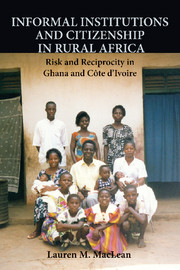 Informal Institutions and Citizenship in Rural Africa
Informal Institutions and Citizenship in Rural Africa Published online by Cambridge University Press: 05 May 2010
UNEXPECTED DIFFERENCES IN INFORMAL INSTITUTIONS OF RECIPROCITY AND CITIZENSHIP IN SIMILAR VILLAGES OF GHANA AND CôTE D'IVOIRE
When I arrived in these villages in the Brong-Ahafo region of Ghana and the Abengourou region of Côte d'Ivoire in the late 1990s, I expected to see many similarities. I was interested in examining the informal institutions of reciprocity and indigenous concepts of citizenship so I had carefully chosen villages that were analogous to each other and representative of their similar regions on a number of critical theoretical criteria. To begin, I thought these four villages would be more similar than different because they shared the same precolonial Akan culture, history, and politics. Well before the establishment of British and French colonial rule in the late 1800s and early 1900s, these villages had all been settled by Akan peoples who resisted incorporation into an expanding Asante empire. The Akan continued to be the predominant ethnic group in each of the villages so I knew the villages still shared similar indigenous institutions of chieftaincy, justice, land tenure, and matrilineal inheritance.
I anticipated that the local economies were alike, too, because Akan farmers had adopted cocoa as the main cash crop around the same time in the early 1900s. These farmers had since encouraged a minority settlement of migrant workers from the North and Sahel, and had recently been challenged by drought and bushfires in the exact same years in the early 1980s.
To save this book to your Kindle, first ensure [email protected] is added to your Approved Personal Document E-mail List under your Personal Document Settings on the Manage Your Content and Devices page of your Amazon account. Then enter the ‘name’ part of your Kindle email address below. Find out more about saving to your Kindle.
Note you can select to save to either the @free.kindle.com or @kindle.com variations. ‘@free.kindle.com’ emails are free but can only be saved to your device when it is connected to wi-fi. ‘@kindle.com’ emails can be delivered even when you are not connected to wi-fi, but note that service fees apply.
Find out more about the Kindle Personal Document Service.
To save content items to your account, please confirm that you agree to abide by our usage policies. If this is the first time you use this feature, you will be asked to authorise Cambridge Core to connect with your account. Find out more about saving content to Dropbox.
To save content items to your account, please confirm that you agree to abide by our usage policies. If this is the first time you use this feature, you will be asked to authorise Cambridge Core to connect with your account. Find out more about saving content to Google Drive.